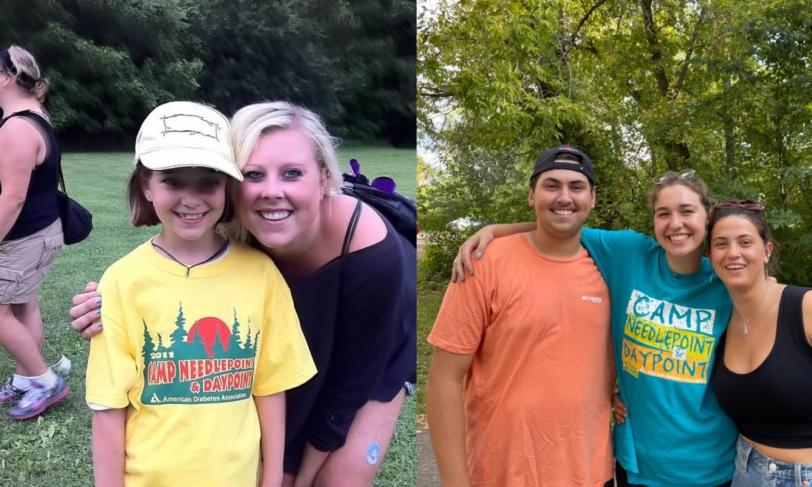
I was 5 when I was diagnosed with diabetes. Being the only diabetic in my family, the learning curve was steep. With the help of an amazing medical team, my family figured out how to manage the around-the-clock demands of an auto-immune disease. We developed a tightly monitored system involving constant finger pokes, multiple check-ins with the school nurse each day, and carrying a JDRF backpack full of set change materials wherever we went. As long as our small team could manage it, it didn’t matter whether my classmates, friends, and teachers understood the medical and emotional turbulence that defined my days. When my doctor first recommended diabetes camp, it sounded strange. Intense physical activity and remote cabins seemed completely counterintuitive to the parents of a kid who has to precisely monitor food and physical activity.
Before I went to camp, my diabetes was isolating. I was never shy, but it was never something I would talk about. Explaining to my 8-year-old friends why I stayed home from school when I had a high blood sugar overnight felt too complex. Going to camp was a rush of excitement. It changed my relationship to diabetes in ways I didn’t know were possible. For the first time, I remember talking to kids my age about the different ways their families’ treated lows, how frustrating it was when you run out of insulin, how teachers misunderstood our pumps, how some set changes really hurt. I discovered that all of my experiences were totally normal. All of the parts of diabetes that can be isolating were points of connection. Suddenly, diabetes was all I wanted to talk about.
When I got back home after that first week, I was surprised to remember that I was the only one of my friends with diabetes. It had seemed so normal - camp was just like anywhere else. People were sporty, nerdy, awkward, goofy, and a whole range of things in between, only they were also all diabetic like me. Being diabetic was the standard. I hadn’t even known that diabetes was a huge part of myself that could connect me with a community. I never missed a year after that.
In many ways, the best parts of camp have nothing to do with diabetes: an environment that necessarily requires its constant presence. It is only when every person shares the knowledge and responsibilities usually carried by one that you can commit full attention to the activity at hand. Everyone jumps all in during Capture the Flag, knowing that in the case of a low blood sugar, there is no safer place to be than the nurse’s station 50 feet away, covered with pyramids of juice boxes and meters. Counselors line their campers up to carb count before spending the night crouched around a campfire telling ghost stories. In this haven, no camper is unusual or forced to be especially responsible. At camp, you can just be a kid.
As much as I loved to connect with the other kids my age and swap stories and A1Cs, my favorite part was meeting the counselors. To my young self, the college aged counselors were as adult as it gets. They towered over me with their backpacks full of tabs and infinite coolness. I had never given much thought to how diabetes would participate in my future, but at camp I was able to see it right in front of me. Here, spending the week with me, were living, breathing role models. They were in college, working all kinds of jobs. They had friends, roommates, spouses. They stayed close and spent time together during the year, outside of camp. They were proud of their diabetes. Like me, they had found a community around the shared experiences we all knew so well. They knew how to manage it easily, if not perfectly. Many of them planned to become nurses and doctors, continuing to pay it forward to the generations of diabetics to come.
Now, when I drive up the winding road to the familiar wooden cabins of camp, it feels like going home. I’ve never spent more than two weeks each year, but the identity I found at diabetes camp has shaped my life in immeasurable ways. Here was a place where I could be completely me. Not having to worry about my blood sugar allowed me to devote my energies to canoeing the St. Croix River, singing around the flagpole, and staying up late talking with my friends. Upon her diagnosis a few years after mine, I insisted on bringing my cousin Lulu to experience what I had found at camp. In weeks, we went from distant relatives to best friends. To this day, we always attend camp together. I have met people from all walks of life, many of whom have become lifelong friends and critical to my support system.
I have finally become a counselor like those I idolized as a young camper. I am in my third year of college, I have a job and roommates and friends. I treasure the times I get to see my diabetic friends, most often at camp during the summer. I hope that my story inspires my campers in the same way I was inspired by my counselors.
On that first day of the week, when the cabin door opens and a new camper walks in, I feel that same rush of excitement I knew as a kid. Some campers are nervous, some practically slam the door on teary parents. I will help them carry the responsibility of their diabetes for them over the next week, and watch what comes in place of it. I know that each one of them will leave having found a part of themselves they couldn’t find anywhere else but camp.
These are the personal experiences of individuals living with diabetes and does not constitute medical advice. Please consult with qualified health care professionals to meet your individual health and medical needs.








